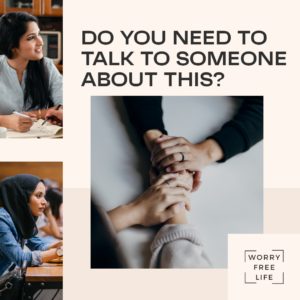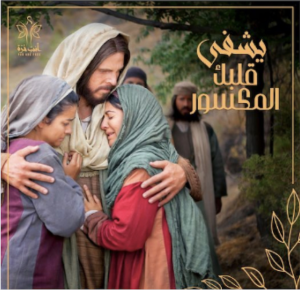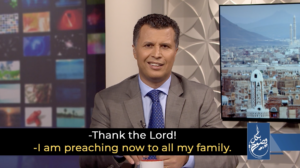Whether it’s television, radio, social media or podcasts, media connects us with the world and with one another. It sparks conversations and creates awareness about critical issues around the globe – one of the most vivid examples being the Arab Spring in 2011. Research during that time revealed that the week before the resignation of the Egyptian president, videos featuring protest and political commentary went viral, with some of the most popular videos recording nearly 5.5 million views.
The recent unrest in Iran is another good example of the power of media, with people smuggling footage of protests and shootings out of Iran at the risk of being arrested or losing their lives. Media has enabled the women of Iran to voice their fears and frustrations and many digital campaigns have gone viral as people around the world demonstrate their support of the freedom of the women of Iran.
From world news to the Good News: a different use of media
Christian ministries in the MENA region have also been leveraging media – but as a tool to share the good news of the gospel with those who are desperately looking for hope. For believers who live in restricted or hostile countries where it is illegal to be a Christian, media platforms often serve as a lifeline.
Some ministries have been broadcasting Christian television programmes since the 1980s in countries like Israel, Jordan and Lebanon. Over the years the number of Christian programmes and channels have increased immensely through the likes of Al Hayat Ministries, Sat7 and MohabatTV, among others.
These programmes offer content that helps Christians to unpack the Bible and answer difficult questions, as well as present the teachings of Jesus to those with no Christian background or upbringing. Media allows people to watch, listen and process the message of the gospel from the privacy and safety of their own homes. This is a great advantage in a region where Christians – a minority group in the MENA region – are often persecuted for their faith.
Stories from the field
Within the Mergon Foundation’s own partnership networks, there are inspiring examples of organisations that are leveraging media to give people hope and point them to Jesus.
Digital campaigns
‘By using simple digital ad campaigns and making use of Google’s keyword research, ministries can reach younger demographics with the gospel in innovative ways,’ says David Benware of Media Impact International (MII).
During Covid-19, MII ran a simple carousel ad campaign in India, Turkey and Pakistan, targeting a specific niche.





After just two weeks, the ‘Worry Free Campaign’ had led to 19,559 inbound messages of people responding to the ad, 1072 people in follow-up conversations with the call centre team, 209 gospel presentations, and 85 people professing their faith in Jesus.
Another campaign example is MII’s ‘You are Free’ Campaign which covered three themes, namely ‘He heals your broken heart’; ‘He Heals your loneliness’; ‘He heals your hopelessness’.



‘The best part about a campaign like this is that it is easy to change and adapt – without costing lots of money. If throwing the net on the one side of the boat, so to speak, isn’t working (ie. no clicks or engagements), a ministry can ‘throw the net on the other side of the boat’ by quickly changing the campaign. Digital doesn’t always have to be super expensive, but you have to be creative, innovative and invite the Holy Spirit in,’ David explains.
Television: still relevant and powerful
Television is also a powerful tool to communicate the Gospel in Morocco. One ministry shares that 252 people committed their lives to Jesus after the airing of one single television show.
Another larger ministry did a survey to determine the viewership across various Christian programmes which they had co-produced and aired in Morocco. They rejoiced over the fact that these had 8,5 million viewers in the survey year and many had accepted Jesus as their Saviour as a result! One programme in particular, Let’s Be Clear, is so compelling because it is presented by a native Moroccan who converted to Christianity.

Brother Rachid hosting Let’s be Clear.
Bridging the gap between correspondence and follow-up
The evidence is clear that people in the MENA region are hungry for hope and truth and media is a successful means to introduce people to Jesus. The challenge, however, is often bridging the gap between correspondence (digital or telephonic) and follow-up (in-person connection and fellowship).
Media Impact International shares some typical questions and statements that their call centre team receives: ‘I am so depressed that I am unable to be happy anymore’; ‘I feel so lonely and no one is there for me’; ‘My life is not changing and I have no hope’; ‘My husband cheated on me so we got a divorce and I’m angry’; ‘How can I break my pornography habit?’; ‘Life is not worth living (suicidal)’; ‘I have cancer. I’m so scared’; ‘Tell me what you people believe about Jesus’.
Heart4Iran (who runs MohabatTV) notes that, in their experience, mostly men call in saying they have noticed how their wives have changed as a result of watching their television programme. They are kinder and softer, and in response, the men often want to learn more about how they can improve too. In addition, many refugees call in, explaining that they have had dreams or visions of a Man in white telling them to love their enemies and they need to find out more about Him.
In the Arab context it’s rare for someone to make a decision for Christ on the same day they have heard the message of the gospel. Follow-up and building relationships are therefore critical because it takes time for people to think about and process it – there’s fear, societal pressures and the like.
Building a sincere friendship with a person who has just accepted Jesus into their life is a long-term process. Nothing is more valuable than discipling people, encouraging them to share the gospel with others, and walking beside them every step of the way as they face difficult circumstances and work through all their questions.
Though it is extremely beneficial to have teams on the ground who can make face-to-face contact with people who have responded to a media outreach, one of the key concepts we have also seen over these past years is that of powerful online Christian fellowship for those who prefer it or who are unable to meet other believers in person. It’s really about journeying with people – connecting them with supportive, loving communities as well as with new friends who understand what they are going through and who can encourage them in their faith.
